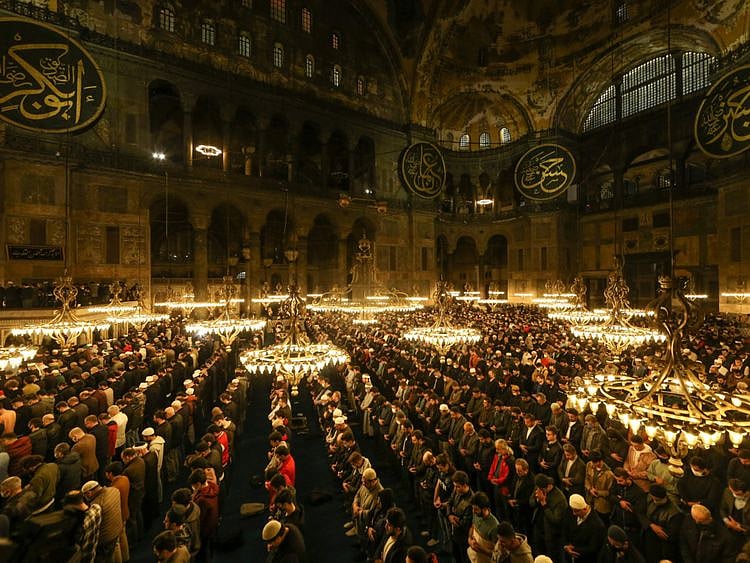Ramadan begins in much of Middle East amid soaring prices
War has sent prices skyrocketing, alongside the usual challenges, merchants say

Cario: Ramadan — when the faithful fast from dawn to dusk — began at sunrise on Saturday in much of the Middle East, where Russia’s military intervention in Ukraine has sent energy and food prices soaring.
The conflict cast a pall over the holiday, when large gatherings over meals and family celebrations are a tradition. Many in the Southeast Asian nation of Indonesia planned to start observing Sunday and some Shiites in Lebanon, Iran and Iraq were also marking the start of Ramadan a day later.
Muslims follow a lunar calendar and a moon-sighting methodology can lead to different countries declaring the start of Ramadan a day or two apart.
Ramadan began on Saturday in Muslim-majority nations including the United Arab Emirates, Saudi Arabia, Egypt and Syria.
Jordan, a predominantly Sunni country, also said the first day of Ramadan would be on Sunday. The kingdom said the Islamic religious authority was unable to spot the crescent moon indicating the beginning of the month.
Indonesia’s second-largest Islamic group, Muhammadiyah, which counts more than 60 million members, said that according to its astronomical calculations Ramadan begins Saturday. But the country’s religious affairs minister had announced on Friday that Ramadan would start on Sunday, after Islamic astronomers in the country failed to sight the new moon.
It wasn’t he first time the Mohammadiyah has offered a differing opinion on the matter, but most Indonesians — Muslims comprise nearly 90% of the country’s 270 million people — are expected to follow the government’s official date.
Many had hoped for a more cheerful Ramadan after the COVID-19 pandemic cut off the world’s 2 billion Muslims from Ramadan rituals the past two years, With Russia’s attacks on Ukraine, however, millions of people in the Middle East are now wondering where their next meals will come from. The skyrocketing prices are affecting people whose lives were already upended by conflict, displacement and poverty from Lebanon, Iraq and Syria to Sudan and Yemen.
Ukraine and Russia account for a third of global wheat and barley exports, which Middle East countries rely on to feed millions of people who subsist on subsidised bread and bargain noodles. They are also top exporters of other grains and sunflower seed oil used for cooking.
Largest wheat importer
Egypt, the world’s largest wheat importer, has received most of its wheat from Russia and Ukraine in recent years. The country’s currency has also taken a dive in recent days, adding to other pressures driving up prices.
“We were going to be affected, at any rate. We just pray that God will make this pass,’’ said customer Hassan Ali Hassan.
The soaring prices exacerbated the woes of Lebanese already facing a major economic crisis. Over the past two years, the currency collapsed and the country’s middle class was plunged into poverty. The country’s meltdown has also brought on severe shortages in electricity, fuel and medicine.
In the Gaza Strip, few people were shopping on Friday in markets usually packed at this time of year. Merchants said Russia’s war on Ukraine has sent prices skyrocketing, alongside the usual challenges, putting a damper on the festive atmosphere that Ramadan usually creates.
The living conditions of the 2.3 million Palestinians in the impoverished coastal territory are tough, compounded by a crippling Israeli-Egyptian blockade since 2007.
Toward the end of Ramadan last year, a deadly 11-day war between Gaza’s Hamas rulers and Israel cast a cloud over festivities, including the Eid Al Fitr holiday that follows the holy month. It was the fourth bruising war with Israel in just over a decade.
Also Read
Oman resumes Taraweeh prayers but bans iftar gatheringsRamadan 2023: All you need to know about taraweeh prayers - When, why and how to perform itRamadan 2022 in UAE: Sheikh Zayed Grand Mosque announces prayer timings, readiness to worshippersIn Istanbul, Muslims held the first Ramadan prayers in 88 years in Hagia Sophia, nearly two years after the iconic former cathedral was converted into a mosque.
Worshippers filled the 6th-century building and the square outside Friday night for taraweeh prayers led by Ali Erbas, the government head of religious affairs. Although converted for Islamic use and renamed the Grand Hagia Sophia Mosque in July 2020, COVID-19 restrictions had limited worship at the site.
“After 88 years of separation, the Hagia Sophia Mosque has regained the tarawih prayer,’’ Erbas said, according to the state-run Anadolu Agency.
Sign up for the Daily Briefing
Get the latest news and updates straight to your inbox
Network Links
GN StoreDownload our app
© Al Nisr Publishing LLC 2025. All rights reserved.